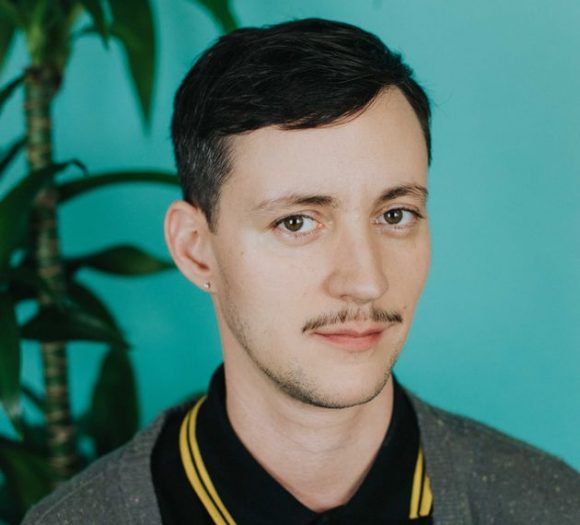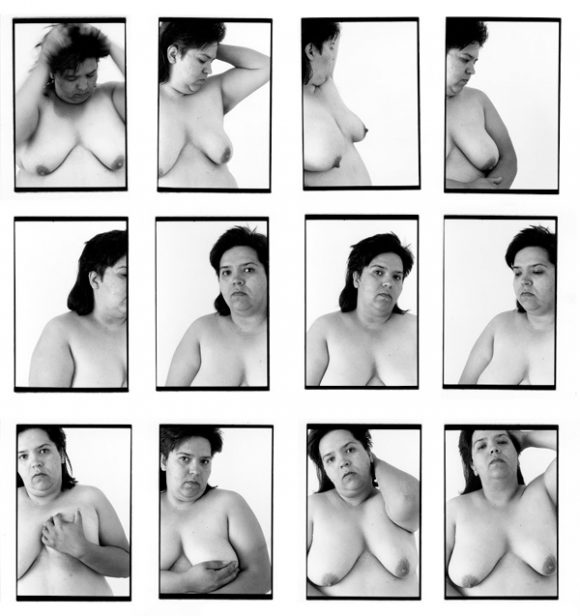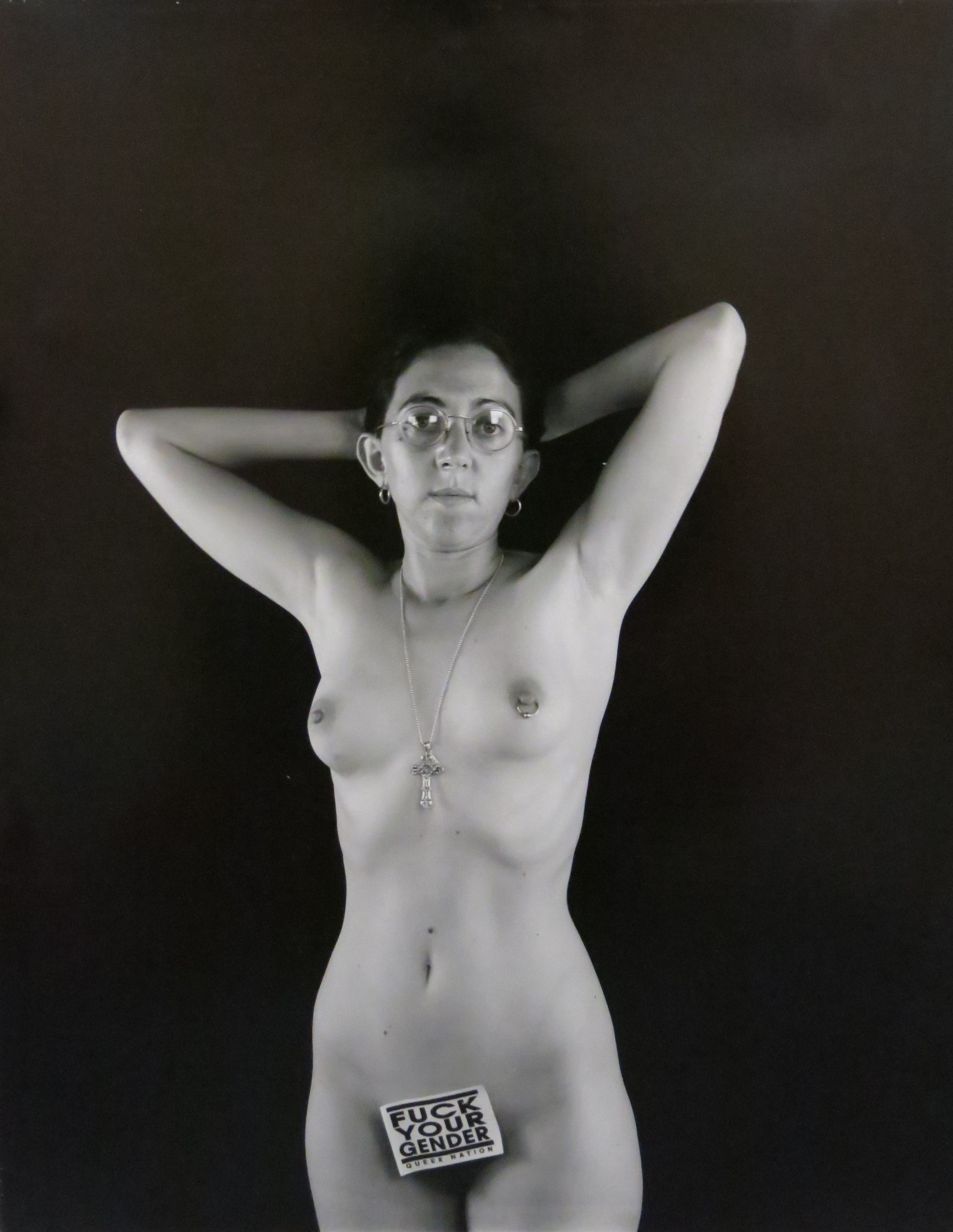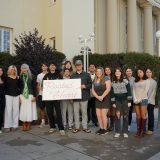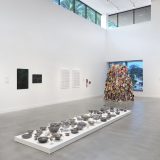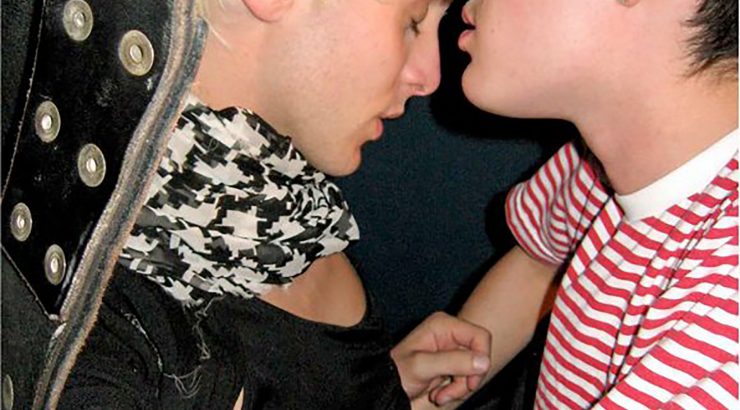
Honoring LGBTQIA+ Artists in the Escalette Collection Celebrating Chapman's LGBTQIA+ History Month
October 15, 2019
To celebrate Chapman University’s LGBTQIA+ History Month, the Escalette Permanent Collection of Art would like to highlight some of the amazing artists in our collection who are a part of, or contribute to, the LGBTQIA+ communities. Their works shine a light on LGBTQIA+ experiences and invite the viewer to critically consider gender norms and social expectations of sexuality.
Zachary Drucker & Rhys Ernst
Zackary Drucker is a transgender woman who uses photography, videos, and performance art to challenge the way we think about gender, sexuality, and physical appearance. Her work breaks down social binaries, including viewer and subject relationships, and male and female relationships, in order to contemplate the appearance of “self.”
Drucker often channels her own experiences of societal exclusion and marginalization to portray her personal physical identity and the physical identity of others. Referring to herself as “a woman in the wrong world,” her work confronts transgender history in America, and combats the painful struggle of many other marginalized communities. Often using her own body, Drucker strives to obliterate barriers and prompt the viewer to challenge their own desires, judgments, and humiliations.
Drucker has performed and exhibited her work internationally in museums, galleries, and film festivals including the Whitney Biennial 2014, MoMA PS1, Hammer Museum, Art Gallery of Ontario, Museum of Contemporary Art San Diego, and SF MoMA, among others.
Rhys Ernst is a transgender writer/director who has dedicated his career to trans storytelling. Ernst received his MFA in Film/ Video at CalArts in 2011 and a BA from Hampshire College in 2004. His student film THE THING premiered at Sundance 2012, and his experimental film SHE GONE ROGUE premiered at the 2012 “Made in LA” Los Angeles Biennial at the Hammer Museum and subsequently in the 2014 Whitney Biennial and “Fan the Flames” at the Art Gallery of Ontario, Toronto. Past screening venues include Oberhausen, Ann Arbor Film Festival, Chicago International Film Festival, Chicago’s Museum of Contemporary Art, Brooklyn Academy of Music, and UCLA Hammer Museum in Los Angeles, REDCAT, and LACE. Ernst aspires to increase transgender representation in media; his films place transgender characters into a larger narrative, expressing their lives outside of the context of their gender representation. Ernst fights for trans rights, believing that representation and support for marginalized communities are crucial.

Zackary Drucker and Rhys Ernst, Relationship #12, C-print, 2010.
Purchased with funds from the Escalette Endowment.
Zackary Drucker and Rhys Ernst are visionary creators, most known for producing the Emmy-winning Amazon series “Transparent.” In 2014, Drucker and Ernst collaborated on a photography series titled “Relationship,” which chronicles the evolution of their relationship and gender transitions over the course of five years. Initially intended to be a private collection of photos, the series of candid, dreamlike photographs portray Ernst and Drucker as both whole and fragmented subjects—figures and bodies obscured by objects or reflected in the mirror–and situated within environments ranging from domestic interiors to lush, outdoor settings. Their work is inherently political, but they shy away from didacticism, instead focusing on sexuality and intimacy. Both artists have backgrounds in auto-ethnography, which Ernst defined as “the practice of creating self-reflective work, or work that reflected [his] community.” Ernst and Drucker believe that, despite transgender stories becoming mainstream, there are few public examples of transgender people leading ordinary lives and fewer cases of transgender people taking control of how they are represented.
Excerpt from one of Ernst and Drucker’s short films titled “She Gone Rogue.” https://www.zackarydrucker.com/new-gallery/2018/11/26/she-gone-rogue
Laura Aguilar
Laura Aguilar is a Latina-American photographer whose quietly powerful work focuses on the experiences of marginalized individuals, including obese people, black women, and lesbians, as well as the perception of her own body. Aguilar was born in San Gabriel, California, just east of L.A. city limits in an area with large Chicanx, Asian American, and black populations. These diverse communities informed Aguilar’s practice and became the subjects of her work. Aguilar often attributed her interest in photography to her late brother, who showed her how to develop film while she was a high school student in the late 1970s. For Aguilar, photography served as both a mode of self- expression and a way to overcome her struggles with an auditory dyslexia disability.
Aguilar never labeled her own sexuality, stating, “I’m not comfortable with the word Lesbian, but as each day goes by I’m more and more comfortable with the word LAURA.”
-Laura Aguilar, caption from Latina Lesbians self-portrait
Aguilar’s work often features nude individuals from the LGBTQIA+, Latinx and Chicanx communities to breakdown social structures of gender and sexuality. Rather than simply accepting marginalization as a condition of her subjects and herself, Aguilar strove to make space for those who had been pushed aside or out of mainstream culture. In the Latina Lesbians series, Aguilar photographed queer women and lesbians and asked them to provide their own captions. The final works act as a platform for Aguilar’s subjects to address their journeys of self-acceptance. The two photographs in the Escalette Collection are from Aguilar’s Clothes/Unclothed (1990-1994) series, in which she represented a Latinx women with a sign stating “Fuck Your Gender” fixed to her vagina. The other works from this series showcase families of various races embracing in different forms of love – a father an his children, two women embracing each other – clothed and then unclothed. The resulting diptychs are a tender, empathetic documentation of a human connection more powerful than strict ideas of race, gender, or sexuality.
Laura Aguilar’s work speaks to so many people. Her work is personal, political, celebratory, and difficult all at the same time. She speaks about a journey of self-acceptance – she speaks about visibility and difference, and the nature of life’s challenges.
-Pilar Tompkins Rivas, Director of Vincent Price Art Museum
-
Laura Aguilar, Fuck Your Gender, Photography, 1991.
Gift of Anne Ayres.
-
Laura Aguilar, Fuck Your Gender, Photography, 1991.
Gift of Anne Ayres.
Millie Wilson
As a member of the LGBTQIA+ community, Millie Wilson’s art conceptualizes and creates “queer stories.” She fabricates an eventful world of queer ideas and bends history to create her own LGBTQIA+ narratives. Wilson “queers” classic narratives and breaks down social stereotypes while using clever wordplay and irony to create her stories. An example of this can be found in her book, Errors of Nature, and its corresponding exhibition. Errors of Nature lists the “symptoms” of lesbianism, extracted from mid-century pulp psychology and sexology books. Her focus on surrealist and minimalist styles create works that, she explains, tell “a secret history of modernity informed by queer sexuality, femininity, race and class.” Her own style confronts social structures with themes of sexuality and gender identity. Wilson represents multiple forms of identification by developing parody, symbolism, and humor in her art. Her multi-media creations explore provoking, disturbing, and humorous connections between historical art styles and sociocultural stereotypes about body, desire, identity, and pathology.

Millie Wilson, Untitled (boys in desert), Color transparency in aluminum light box, 2013.
Purchased with funds from the Escalette Endowment.
Millie Wilson’s work has been exhibited in the U.S. and abroad, including New York, Los Angeles, London, and Rome, to name a few. Currently, her work is in numerous public and private collections, including the UCLA Hammer Museum, the San Francisco Museum of Modern Art, and the Orange County Museum of Art. She has received numerous grants, including an NEA Visual Artists Fellowship and a Pollock-Krasner Foundation Fellowship. Wilson has been published in various literatures, and also lectured throughout both the U.S. and Europe.

